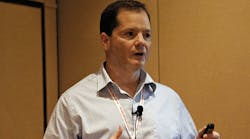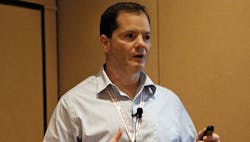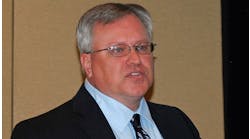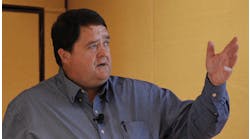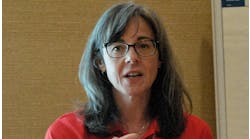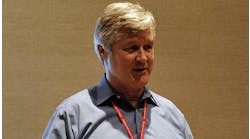“The complexity of our migration is not in the size of our facility, but in the amount of physical assets we need to migrate.” Corteva’s Al Llorens explained the companywide initiative to modernize batch control systems from an ageing, proprietary platform to Honeywell PKS.
Think of it like repotting a plant.
Corteva, an Indianapolis-based agricultural-chemical company, needed to modernize its manufacturing control systems, moving away from the MOD 5 DCS—a legacy of former parent company Dow Chemical and a rapidly aging system with declining reliability. It was outdated. It posed integration challenges with modern IT systems. And because Corteva, like many modern enterprises, was suffering knowledge drain caused by a retiring workforce, they figured the time was right to make the move to a new system.
But they didn’t want to lose their existing asset data, data that pertains to the numerous physical assets at their main three production facilities in Midland, Mich.; Pittsburgh, Calif.; and Drusenheim, France.
“Our objective was to standardize our processes and roll out concise solutions across our many assets,” explained Al Llorens, program technical leader for Corteva’s migration initiative, during this case-study presentation during the Honeywell Users Group (HUG) America conference this week in Orlando, Fla. “Secondly, we wanted to be careful to migrate our functionality but not our code.”
Translation: they wanted to maintain their application functions in a system-agnostic way. They wanted to keep doing the work they were doing, but using a smarter system to get it done.
That probably sounds familiar to anyone who has undertaken a migration like this.
After exploring options and browsing solution-providers, Corteva chose Honeywell Process Solutions to spearhead the project, which launched just prior to the pandemic. “We wanted to implement this system in an Experion methodology,” explained Llorens.
The Corteva Honeywell Automation Migration Program (CHAMP) is a multi-year initiative to modernize Corteva’s manufacturing control systems by migrating to the Experion Process Knowledge System (PKS). The main goal is to increase manufacturing-asset flexibility beyond mere porting of the existing code, but rather implementing S88 batch-control principles in all of the agrichemical enterprise’s processes. “A migration like this is really a great opportunity,” said Llorens.
For the first half of the presentation, the technical leader detailed the challenges unique to Corteva’s corporate structure and its dispersed physical assets, and highlighted what were determined to be key success factors for the project. Big picture: optimizing the manufacture of new products with existing assets. Smart agriculture outputs from a brownfield environment.
Then Llorens’ counterpart in the CHAMP initiative took the mic. Honeywell Process Solutions Principal Batch Engineer Ronald Kleber dove into the bespoke programs he created in partnership with the Corteva team and explained how Experion Batch solutions have been applied to make this a successful initiative throughout the early stages of the migration.
Kleber summed up this complex, multi-faceted, multi-year, international program when he uttered this line: “We talked to the people at the facilities and found out what was special to them about their systems. Then we figured out how to do that in Experion.”
The Honeywell engineer explained how the partners developed a fully functional demo plant to offer early exposure to the new Experion system to those Corteva staffers who would be using it, helping them develop a basic understanding of the S88 batch solution. “It is critical to get early buy-in from all stakeholders,” he said.
The CHAMP program leaders hosted process simulations and clearly defined and communicated new HMI standards to the team. They maintained a testbed for the key elements of the migration. Pilots were launched at the Midland active-ingredient facility and the Drusenheim formulation facility in order to kick the tires in different environments with different processes.
Kleber repeatedly stressed the value in Honeywell’s highly templatized applications—control-module templates covering a range of DCS functions. He explained their Generic Equipment Module approach to implementing state-driven equipment modules. And he spotlighted the value in using one “Flexible Phase” template per function to cover all differences among equipment types.
“The complexity of our migration is not in the size of our facility, but in the amount of physical assets we need to migrate,” said Llorens, adding that standardized solutions are a top priority for their ultimate system. “We’re at a unique point where we have the opportunity to roll out consistent solutions across our manufacturing assets. We want to take advantage of new technologies and implement systems in the Experion methodology—really embrace S88 design principles. And we want to do this while increasing the flexibility of our manufacturing-assets.”
This is still a work in progress, the pair stressed, referencing how these early migrations will inform future migrations within other elements of the Corteva enterprise. “The key is collaboration,” said the Corteva rep, as his Honeywell counterpart nodded his head. “Partnership is important. We are both invested in each other’s success.”
The editors of Control, Control Design and Smart Industry are reporting live from 2022 Honeywell Users Group in Orlando, Florida, to bring you the latest news and insights from the event. When the event comes to a close, the best, most important coverage will be compiled into a report by the editors.
Register now to pre-order the report and be among the first to receive it in your inbox.
